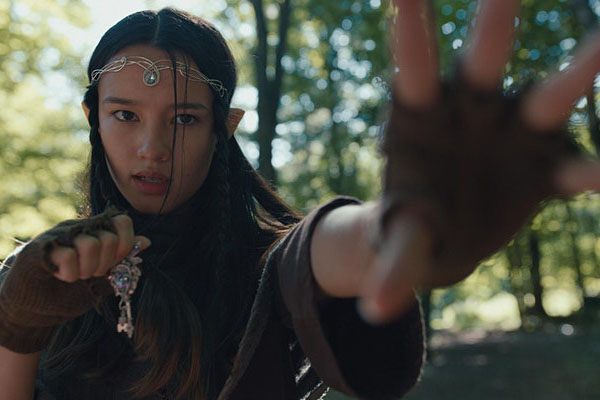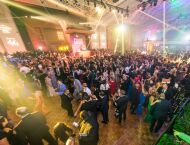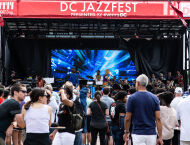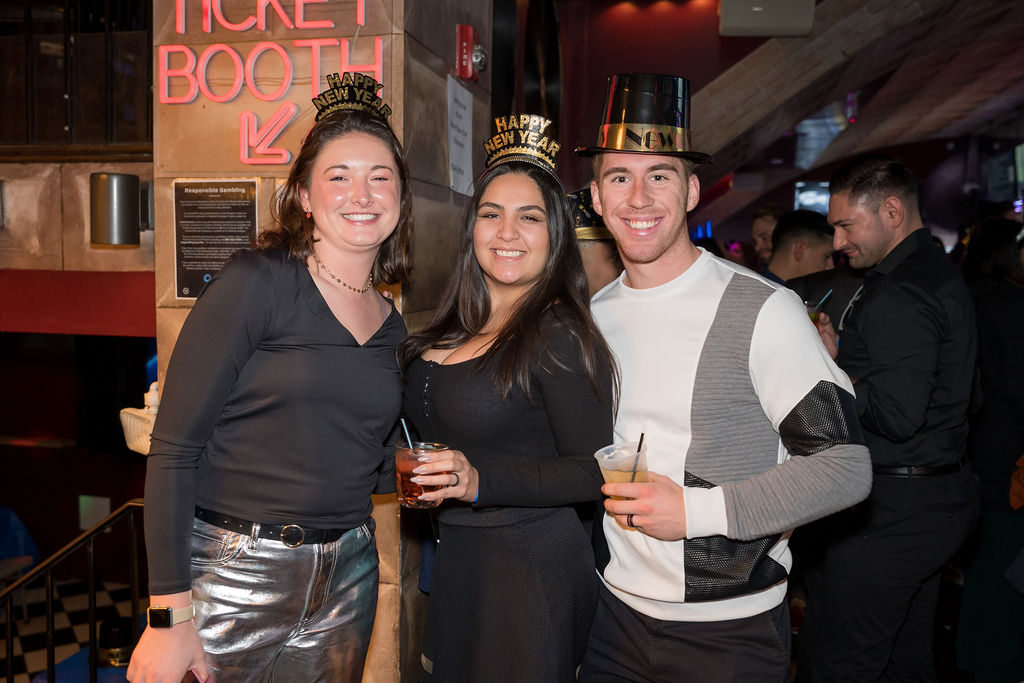Culture
 Short film "Break Any Spell." Photo courtesy of DCIFF
Short film "Break Any Spell." Photo courtesy of DCIFF
The Future is Now For D.C. Independent Film Forum
March 2, 2022 @ 12:00pm
As Covid-19 numbers stabilize in the District and throughout the country, movie theaters have begun hosting more and more people in search of a return to cinema. While blockbusters and big-box releases will always hold a special place in society’s collective heart, it’s important to remember most filmmakers creating on those mammoth scales started somewhere small, most likely showcasing indie films on the festival circuit before their major studio breaks.
This week, from March 2-6, the D.C. Independent Film Forum (once known as the D.C. Independent Film Festival) returns with a slew of in-person events, screenings and discussions intended to kick start the organization’s new initiative in cultivating smaller-scale experiences to give attendees truly unique movie memories.
Whether it’s rubbing elbows with the subject of a featured documentary, learning how the sausage is made behind horror shorts or simply investing time in a more in-depth conversation, we spoke to executive director Deirdre Evans-Pritchard about this week’s festivities and the future of the forum.
District Fray: How does it feel to have an opportunity to host audiences who, likely, love cinema and maybe haven’t been able to experience films in person in a while?
Deirdre Evans-Pritchard: We think it’s fantastic and yet we are very well aware things have shifted. The streaming world came and hit us about five years ago anyway. From the point of view of filmmakers, streaming is great. For film festivals, it makes it kind of hard. I’m not a huge proponent of an online film festival, so for us it’s amazing that filmmakers are coming into town — it’s a sign they too were looking for an opportunity to engage with one another and audiences. I think people are just keen to do things in person again.
How imperative is it for small film festivals and film forums to conduct their events in person?
Film festivals are potentially on the way out. Some of these festivals are going online, which takes you away from the place you are in. We’re a very D.C. festival, so that connection would go out the window. On one level, festivals get excited [going virtual] because of the reach streaming provides. What we’ve learned is: We’d like to be even more curated than we were. People submit and are selected by a review team, and then it’s the final cut that I program, though I’m likely to pass that on. [This process] really works for in-person festivals.
Why the name change?
We’ve been the D.C. Independent Film Festival and now we’re switching to the D.C. Independent Film Forum. What do we mean by this? That simply showing the movie is no longer the most important part of our events. [We’re excited to] have filmmakers come and meet audiences, and get feedback while giving attendees something more than what they can watch online. This is our place and a lot of festivals that move forward will eventually become similar. Even Sundance is moving forward with these kinds of initiatives. If you’re a festival like us, our films are to put people on the map and provide a unique experience.
These initiatives began evolving last year — and then we were hit with Omicron. Now society is past the latest variant, how has it been bringing those ideas to life?
Until January, there wasn’t a theater willing to have us. The only film showing was “Spider-Man.” That was difficult. I went to see a movie to test it out and it was me and three people in the building — not in my theater, but in all five theaters. I had to gauge whether or not people would actually come out. We’re not expecting the large theaters we used to have — we’re rational. We wanted to make it smaller anyway because our future is in smaller communities interacting. Not only that, people have adjusted themselves to not going out to movies. If we didn’t put the festival in person this year, we may have moved away from putting it on in person in the future. We believed that by March things would change, and it’s looking that way.
You mentioned more intimate audiences. Are those still vital for film festivals and forums, apart from the opportunities streaming provides?
This Zoom world is a big shift. It has great things: We can talk to our families whenever we want, but people are often lost in the mix. Six of our feature films are world premieres, so that opportunity —getting a live audience and people they can talk to, [including] other film festivals and the press — that’s why I think they’re keen to do it. In the old days, they may go rushing around the world for 25 film festivals but now, maybe not.
What else should attendees know about how this year’s event differs from past years?
First of all, I’m going to say this year is transitional because we’re not quite to our end goals yet. Instead of people coming to a screening, I envision it as an entire day or a weekend. That audience is there to interact with films and filmmakers in different ways. In most festivals, the filmmakers are taken care of very well, and then there’s the audience. What we want to do is bridge that gap so audiences feel they can interact and have a say in how films are talked about. People do try to bridge with conversations, but we want to take it a step further. We’ve also developed a huge emphasis on visual imagery. This won’t be featured this year, but we want attendees to leave with an understanding of the visual capabilities of our phones and cameras, and how that’s a big part of our lives. The old style of media literacy is, “Oh look, here’s an ad next to writing,” but now with the moving picture, people really need to look at how the whole mini-film and even your news is put together. This will help people understand what they’re presented and why it’s being done a certain way. Everyone learns how to read and write, but not everyone knows how to make films.
This sounds a lot like a convention.
That’s why we call it a forum, and in this context of this year we have to be very structured. However, next year maybe we’ll have screenings all day and night and workshops to dip into next door. Maybe there will be an online version, too. The idea is to no longer have 5,000 people at the festival. We’d much prefer to have 500 people engaged the whole time and go that way.
I noticed the word “debate” used in your press release. What will debate look like in a film forum setting?
What I mean by “debate” is people are willing to take on a topic and run with it. As it stands, someone shows a film and gets up and does a Q+A, and they talk about the film and the audience asks questions. There’s never enough time to go deeper and there’s also a level of politeness. For example, our opening night film “My Childhood, My Country,” took 20 years for them to make and there’s a lot to debate. There’s so many things to discuss and dissect with regards to the topic. The way I like to describe it is that it’s like a book club for films where you can pull it apart and discuss it in depth. We want to give filmmakers the opportunity to really have people talk about it. This all sounds very serious [laughs] but we’re not trying to become the film university of the world, either.
What are a few films you’re most excited about — and which do you think people will be surprised by?
We have a new film, a world premiere entitled “Living in Dillusionville,” which is a documentary about Ron English. He’s coming to paint a mural in D.C. He’s reaching the end of his career so it could even be the last mural he paints. There’s an opportunity to have tea and cookies with him, which along with the mural is a great connection. Then, we have another very silly one titled “Bootyology,” which is a mockumentary about a rap duo who disappears and comes back many years later to try and make it to the top again. We believe that will be one of our party events. The film’s faux subjects the Booty Boys, who are actually pretty good rappers, are coming to town, too.
Another is the shorts. I’m very keen on the short programs because they often get left behind, and we have a group of five films that are from people across the world. We have a little horror section like that; most of the filmmakers attend and offer the opportunity to hear from them after the screening, where they’ll give tips to the audience on how they pulled the scares off. Our closing night film is going to be a blast. It is made by the first fully women’s American-Muslim team, and we’re dubbing it the “Asian ‘Coming to America.’” The film is titled “Americanish,” by Iman Zawahry in her first feature; she’s an alumna from the festival/forum.
For more information about the D.C. Independent Film Forum festivities, ticket prices or film screenings this week, visit www.dciff-indie.org.
Enjoy this piece? Consider becoming a member for access to our premium digital content. Support local journalism and start your membership today.








